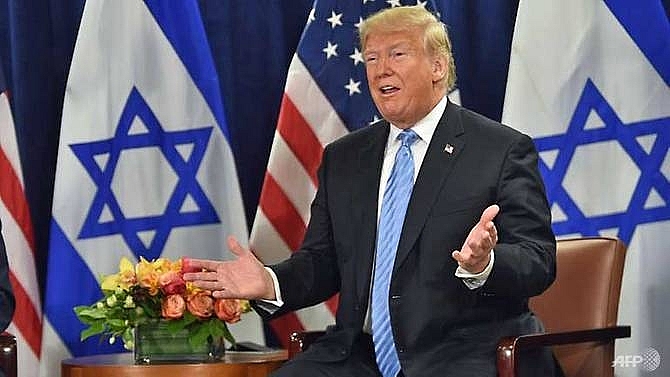Trump pledges Mideast peace plan within months
 |
| US President Donald Trump speaks as he meets with Israeli Prime Minister Benjamin Netanyahu (unseen) in New York on the sidelines of the UN General Assembly. (Nicholas Kamm/AFP) |
Holding talks with Israeli Prime Minister Benjamin Netanyahu in New York, Trump said it was a "dream" of his to bring about a peaceful solution to a conflict that has eluded several of his predecessors.
While Trump said he expected Israel to make concessions in any final settlement of the decades-old conflict, the Palestinians said his administration's policies in the Middle East were destroying hopes of peace.
Jared Kushner, who is Trump's son-in-law as well as a senior advisor in the White House, has been working on a peace plan for more than a year but there have been few clues to date of what he is expected to propose.
"I would say over the next two to three to four months," Trump said, referring to his prospective timetable for presenting a plan.
Trump, who met with Netanyahu on the sidelines of the UN General Assembly, said explicitly for the first time that he backed a two-state solution, saying: "That's what I think works best, that's my feeling."
"I really believe something will happen. It is a dream of mine to be able to get that done prior to the end of my first term," added Trump, who was elected to serve four years through January 2021.
"Jared, who's so involved, he loves Israel but he's also going to be very fair with the Palestinians," the US president later told a news conference.
ISRAEL 'WILL HAVE TO DO SOMETHING'
"Peace between Israel and the Palestinians for the Middle East is a very important thing and we're trying very hard to get it," he added.
"I think probably two-state is more likely but if they do a single, if they do a double, I'm okay with it if they're both happy. If they're both happy, I'm okay with either. I think the two-state is more likely," he said.
Middle East peace efforts effectively stalled when the Palestinians broke off contacts with the Trump administration last year in protest at Trump's decision to recognise Jerusalem as the capital of the Jewish state.
The US president ordered the relocation of the US embassy from Tel Aviv to Jerusalem.
The Palestinians also want Jerusalem to be their capital and have long argued that the status of the holy city should only be settled as part of a larger peace agreement.
Relations between the Palestinian Authority and the United States plunged even lower in recent weeks after Washington cut off funding, including to a UN agency that helps millions of Palestinian refugees.
Trump said, however, that he was in no doubt that the Palestinians would soon return to the negotiating table. "Absolutely, 100 per cent," he said.
"Lots of good things are happening," said Trump, before adding: "Israel will have to do something that will be good for the other side."
Initial reactions, however, underlined the uphill struggle Trump will face in convincing the Palestinians that he is a neutral broker and then convincing the Israelis to make any concessions on security.
'SECURITY CONTROL'
"Their words go against their actions and their action is absolutely clear (and) is destroying the possibility of the two-state solution," Husam Zomlot, head of the recently closed Palestinian mission in Washington, told AFP.
He said that Trump's comments alone were not enough to bring the Palestinians back to the negotiating table.
Israeli media quoted Netanyahu as saying that Israel must retain security control in any peace deal with the Palestinians, west of Jordan to the Mediterranean - which includes the occupied West Bank.
"Israel will not relinquish security control west of Jordan. This will not happen so long as I am prime minister and I think the Americans understand that," he reportedly said.
Several of Trump's predecessors have played leading roles in trying to bring an end to the conflict, including Jimmy Carter who brokered the 1978 Camp David agreement which saw Egypt and Jordan formally recognise Israel.
Bill Clinton oversaw the Oslo peace accords a quarter of a century ago which spelled out the aim of a two-state solution and allowed for the creation of the Palestinian Authority which is meant to rule over the West Bank and Gaza Strip.
But it left issues such as the exact borders and the status of Jerusalem unresolved.
Egypt and Jordan are the only Arab nations that formally recognise Israel.
What the stars mean:
★ Poor ★ ★ Promising ★★★ Good ★★★★ Very good ★★★★★ Exceptional
Related Contents
Latest News
More News
- Russian President congratulates Vietnamese Party leader during phone talks (January 25, 2026 | 09:58)
- Worldwide congratulations underscore confidence in Vietnam’s 14th Party Congress (January 23, 2026 | 09:02)
- Political parties, organisations, int’l friends send congratulations to 14th National Party Congress (January 22, 2026 | 09:33)
- 14th National Party Congress: Japanese media highlight Vietnam’s growth targets (January 21, 2026 | 09:46)
- 14th National Party Congress: Driving force for Vietnam to continue renewal, innovation, breakthroughs (January 21, 2026 | 09:42)
- Vietnam remains spiritual support for progressive forces: Colombian party leader (January 21, 2026 | 08:00)
- Int'l media provides large coverage of 14th National Party Congress's first working day (January 20, 2026 | 09:09)
- Vietnamese firms win top honours at ASEAN Digital Awards (January 16, 2026 | 16:45)
- ASEAN Digital Ministers' Meeting opens in Hanoi (January 15, 2026 | 15:33)
- ASEAN economies move up the global chip value chain (December 09, 2025 | 13:32)

 Tag:
Tag:




















 Mobile Version
Mobile Version